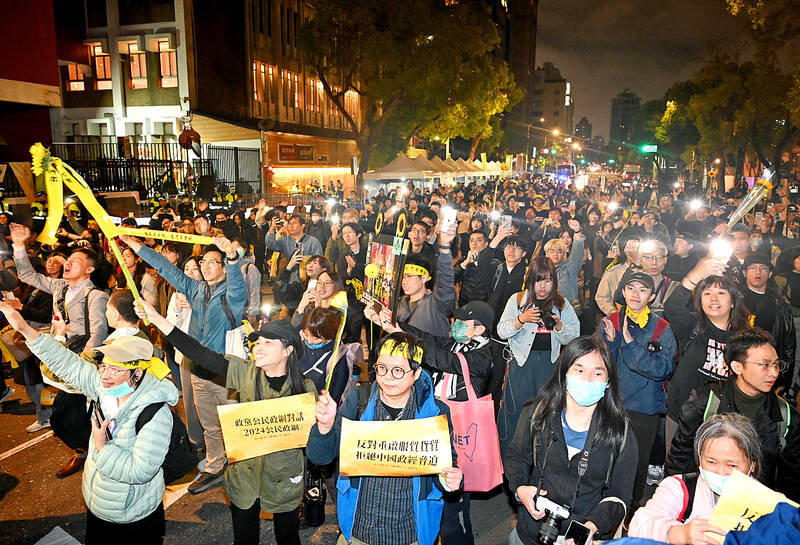Ten years ago today civil society activists were occupying the legislature, bolstered by tens and sometimes hundreds of thousands of protesters in the streets nearby, in what came to be called the Sunflower movement. They quite possibly saved Taiwan’s sovereignty and even its democracy.
There are a considerable number of retrospective pieces being written to commemorate the decade mark. Almost all describe what happened and some of the ramifications in domestic politics.
There is surprisingly little discussion of why they did what they did, and the ramifications if they had failed. This is of far more import.

Photo courtesy of Lin Ba-ting
The Sunflower movement stopped the legislative ratification of the Cross-Strait Service Trade Agreement (CSSTA), which had been negotiated and signed in black box negotiations in Shanghai the year earlier between the Straits Exchange Foundation (SEF) appointed by the administration of then Chinese Nationalist Party (KMT) president Ma Ying-jeou (馬英九) and China’s Association for Relations Across the Taiwan Straits (ARATS). The CSSTA would have opened 64 sectors of the economy to China, many with critical national security implications.
Had a trade agreement been signed with the US or Japan, aside from perhaps some disgruntled farmers, there would have been no mass protests. Overall, most of the public would probably have considered an agreement with either of those countries a big win.
China is no ordinary trading partner. The behemoth across the strait openly wants to annex Taiwan, and would use any tool at its disposal to advance that goal.

Photo: Wang Yi-sung, Taipei Times
THE UFWD AT WORK
In Taiwan, the US, Australia, Canada and the UK, among others, the CCP and their United Front Work Department (UFWD) have been working to undermine elections, use campaign funds or income opportunities to develop financial dependency among politicians and key people, and have paid former police officers in the US to monitor and harass dissidents. They have even established secret police stations in many nations around the world.
If the CSSTA had passed the CCP and UFWD would have been able to conduct these activities in Taiwan at a massive scale. Unlike in most countries where they have to be careful, they would have been able to do so in the open and almost entirely legally.

Photo: Wang Yi-sung, Taipei Times
China does not allow for private institutions, society groups or private businesses of any size to operate entirely independent of the CCP and all are required to follow any instructions or answer any demands made of them by the party. According to the CCP, in 2017 73 percent of all private firms had Communist Party cells as did 92 percent of China’s top 500 private enterprises last year.
Under Chinese leader Xi Jinping (習近平), state-owned and mixed-ownership enterprises have been favored and as of the end of last year made up nearly two-thirds of the top 100 corporations by market capitalization. With the performance of the stock markets in China this year, that ratio has likely increased as SOEs with overseas operations have been ordered to buy Chinese stocks to prop up the market.
WHAT COULD HAVE BEEN
We can not know for certain how things would have played out had the CSSTA passed, but we can have a pretty clear idea of the things that they would have tried to accomplish. If it had passed, they would have had the remaining two years of the Ma administration to put their plans in motion and embed themselves in ways that subsequent administrations would have found difficult to unravel.
At the most fundamental level, the CCP would have hoped to accomplish what the UFWD often does to undermine key figures and make them dependent on Chinese cash, but on a grand national scale. Dependency at scale would have integrated Taiwan into the Chinese economic sphere and helped pave the way for eventual annexation into China, which was precisely what Ma had hoped to accomplish.
The CCP would have attempted to turn Taiwan first into a vassal state, then incorporate it into the empire. This has been how imperial China operated for centuries.
One priority would be to get a significant number of soldiers and spies into Taiwan operating as students, businesspeople or tourists. If they could get enough of the right types of people into Taiwan it could very advantageous for destroying key infrastructure or conducting a top leadership decapitation strike in a war.
The CCP already maintains ties to the underworld in Taiwan, and these would have been significantly expanded in the late Ma years. This opens up significant opportunities for smuggling weapons, getting information on locals to be used as proxy muscle for various tasks as they did in Hong Kong.
LEGALIZED CCP ESPIONAGE
The CSSTA would have effectively made espionage, including corporate espionage, legal. In the list of services to be opened up to China, market research, management consulting, technical testing and analysis, consulting services related to science and technology and packaging are all included.
Those openly operating research-gathering operations are just the tip of the iceberg. Other service markets opened by the pact include mailing list editing, telecommunication, land transport of courier services, hospital services, social services, travel agency services, sales and marketing of air transport services, storage and warehousing services, freight transport agency services, washing and cleaning services, insurance, banking and securities services.
By investing in those services, it would be possible to find out quite a bit about any person, agency, company, industry and even the military. Taiwan would have been an open book.
For example, by buying the right banks, insurance companies and securities firms and promoting Chinese payment systems like UnionPay, they would be able to get access to much of everyone’s financial information. It would have been nearly impossible to avoid a payment going through some Chinese-owned entity or even ATM machine, all of which require sharing a balance statement.
Investing in health opens access to National Health Insurance records, through telecommunications they could own or operate much of the infrastructure that runs the cell phone systems and the internet. Using information from the various transport services, they could find out what companies and the government were shipping to and from where and in what quantities.
They would have also had a lot of tools to undermine Taiwan’s free press. Included on the list were publishing, advertising, film import quotas and even the operation of movie theaters.
There would no doubt have been an effort to purchase much of the pan-green press or make it dependent on their advertising money. There have been allegations of self-censorship made against local pan-green media in the past (not the Liberty Times, the sister paper of the Taipei Times) due to the influence of large advertising contracts, though as far as I know no cases have been proven.
SPOTTING PREY
Considering the large numbers of UFWD agents that would have been able to get into the country, with all the information they would have had at their fingertips, it would have been easy work to subvert nearly anyone. The UFWD is highly trained in spotting weakness, then exploiting that for their ends.
For some a honey trap might be most effective, for others greed and in other cases blackmail. If they know how much money you have, what things are being delivered to your home, your browsing history, phone records and your health records, it is highly likely they can find a weakness in nearly anyone at any level of government, business, society and military.
For those who are spotless and do not appear to have anything to exploit, there still remains the option of sending in the gangsters. It would be hard to run a free press, govern and keep corporate secrets in an environment where there is a tool the UFWD can utilize to undermine and subvert almost anyone.
Chinese-style corruption would have quickly spread, including in government, in the police and in the military. Too many subverted people would have had little choice but to acquiesce.
These are just some of the things they would have attempted to do that the CSSTA would have opened the door to, and would have had at least two years to attempt to succeed at. How far they could have gotten, and how effective subsequent administrations would have been are unknown, but undoing the damage done would not have been easy had it passed.
Courtney Donovan Smith (石東文) is a regular columnist for Taipei Times, the central Taiwan correspondent ICRT FM100 Radio News, co-publisher Compass Magazine, co-founder Taiwan Report (report.tw) and former chair of the Taichung American Chamber of Commerce. Follow him on X: @donovan_smith.

On April 26, The Lancet published a letter from two doctors at Taichung-based China Medical University Hospital (CMUH) warning that “Taiwan’s Health Care System is on the Brink of Collapse.” The authors said that “Years of policy inaction and mismanagement of resources have led to the National Health Insurance system operating under unsustainable conditions.” The pushback was immediate. Errors in the paper were quickly identified and publicized, to discredit the authors (the hospital apologized). CNA reported that CMUH said the letter described Taiwan in 2021 as having 62 nurses per 10,000 people, when the correct number was 78 nurses per 10,000

As we live longer, our risk of cognitive impairment is increasing. How can we delay the onset of symptoms? Do we have to give up every indulgence or can small changes make a difference? We asked neurologists for tips on how to keep our brains healthy for life. TAKE CARE OF YOUR HEALTH “All of the sensible things that apply to bodily health apply to brain health,” says Suzanne O’Sullivan, a consultant in neurology at the National Hospital for Neurology and Neurosurgery in London, and the author of The Age of Diagnosis. “When you’re 20, you can get away with absolute

May 5 to May 11 What started out as friction between Taiwanese students at Taichung First High School and a Japanese head cook escalated dramatically over the first two weeks of May 1927. It began on April 30 when the cook’s wife knew that lotus starch used in that night’s dinner had rat feces in it, but failed to inform staff until the meal was already prepared. The students believed that her silence was intentional, and filed a complaint. The school’s Japanese administrators sided with the cook’s family, dismissing the students as troublemakers and clamping down on their freedoms — with

As Donald Trump’s executive order in March led to the shuttering of Voice of America (VOA) — the global broadcaster whose roots date back to the fight against Nazi propaganda — he quickly attracted support from figures not used to aligning themselves with any US administration. Trump had ordered the US Agency for Global Media, the federal agency that funds VOA and other groups promoting independent journalism overseas, to be “eliminated to the maximum extent consistent with applicable law.” The decision suddenly halted programming in 49 languages to more than 425 million people. In Moscow, Margarita Simonyan, the hardline editor-in-chief of the